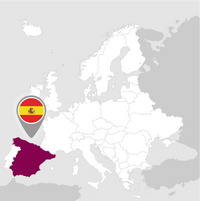Descrizione
Penedes is situated to the Southwest of Barcelona and is the largest and most important wine producing region of Catalonia. Penedes can accommodate a wide variety of grapes and the wine makers of the region are not shy about experimenting, which takes place on a large scale. Due in part to this fact, Penedes wines are quickly gaining a popular reputation. The white wines and rosados have dramatically increased in quality with the application of modern techniques. However, the most famous Penedes product is still Cava (a sparkling wine).
The makers of Palau, Mont Marcal, certainly have a name to uphold as they are ranked in the top three Cava producers in Spain. The proprietor, Manuel Sancho, and his daughters have succeeded in improving the quality on an almost yearly basis through good organization and investment in new technologies. Unbelievable value for this price: a wine following the true ‘methode traditionelle’ of fermentation in the bottle, made from the classic Cava grapes – Parellada, Macabeo and Xarel-Lo.
Fine bubbles, a soft, fruity flavor featuring aromas of green apples finished off with a smooth, rounded aftertaste. Ideal for large receptions and parties.
Dettagli

Profumo

Colore

Sapore
Servire a:
06 - 08 °C.
Longenvità:
03 - 05 anni

Abbinamenti


| Nome | Cava Palau Gazo Traditional Method Rosado Brut |
|---|---|
| Tipologia | Rosato biologico spumante metodo classico |
| Classificazione | Cava DO |
| Formato | 0,75 l |
| Grado alcolico | 11.5% in volume |
| Vitigni | 100% Trepat |
| Nazione | Spagna |
| Regione | Catalogna |
| Produttore | Palau |
| Temperatura di fermentazione | 12 4°C |
| Tecnica di produzione | La raccolta viene fatta meccanicamente, le uve vengono diraspate, raffreddate a 12 ° C e macerazione per 12 ore. La massa viene premuto pneumaticamente ad una pressione di 0,2 kg, selezione del mosto, stabilizzazione per una fermentazione a 12 4 ° C per 15 giorni. |
| Vinificazione | E' travasato dopo la fermentazione alcolica e sottoposto a chiarificazione, stabilizzazione tartarica e filtrazione finale. La seconda fermentazione avviene in bottiglia per un periodo compreso tra 9 2 mesi presso la cantina. |
| Acidità totale | 6.0 |
| Zuccheri residui | 8.0 |
| Allergeni | Contiene solfiti |




